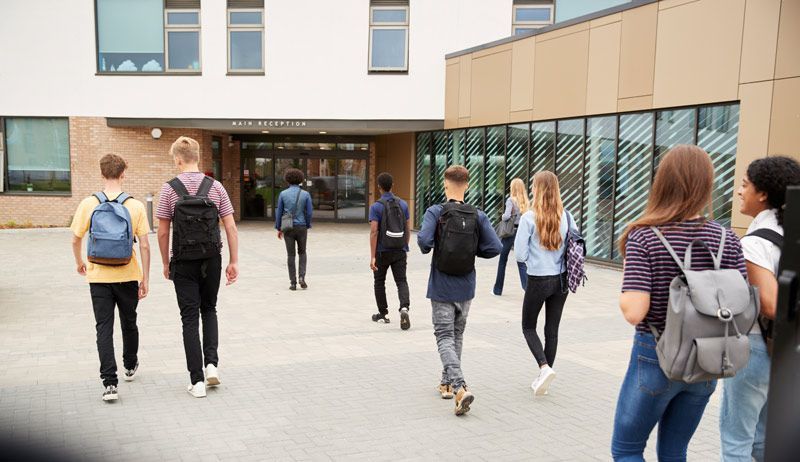Dressing for Success: What High School Students Should Wear to a College Recruiter Interview
High School Students and Parents!
Please Register to be notified of upcoming college fairs and news based on the location, major, and area of study of the college or university you wish to attend.
Important Tips for Preparing For Your College Fair Recruiter Introductions

As high school students prepare for college interviews, one key aspect that often contributes to a successful first impression is their choice of attire. When meeting with college fair recruiters, students need to present themselves as polished, professional, and ready for the next stage of their educational journey. This blog will explore what high school students should wear for a college recruiter interview and offer valuable tips on how to present themselves effectively.
Understanding the Importance of Presentation
First impressions matter, and the way students dress can significantly influence how they are perceived by college recruiters. Dressing appropriately shows that a student respects the interview process and is serious about their future education. A well-thought-out outfit can help instill confidence, allowing students to focus on articulating their thoughts and showcasing their personalities.
What to Wear: Outfits for Success
When considering what to wear for a college recruiter interview, students should aim for a balance between professionalism and personal style. Here are some key guidelines for both men and women:
1. For Men:
- Suit or Blazer: A well-fitted suit or a blazer with slacks is a safe choice for a professional look. Navy, charcoal, and black are versatile colors that convey seriousness. If opting for just a blazer, it can be paired with smart trousers that complement its color.
- Dress Shirt: A long-sleeved, collared dress shirt is essential. Solid colors or subtle patterns work well; avoid overly bright colors or wild patterns that may distract from the conversation. Ironed shirts convey attention to detail.
- Tie (Optional): Wearing a tie can elevate an outfit and add a touch of formality. A simple, classic tie that matches the shirt is advisable—but if a blazer is worn, it may not be necessary if the overall look remains professional.
- Dress Shoes: Clean, polished dress shoes are a must. Oxfords or loafers in black or brown leather work well. Comfort is also key, so make sure the shoes have been broken in for the occasion.
2. For Women:
- Suit or Blazer: Just like for men, a tailored suit or blazer paired with slacks or a pencil skirt is an excellent choice. Neutral colors such as navy, gray, or black are both professional and stylish.
- Blouse or Top: A blouse or smart top can be worn under a blazer. Look for options that are professional yet not overly revealing. Avoid low-cut or see-through materials to maintain a respectful appearance.
- Dress or Skirt: A knee-length dress or skirt paired with a blazer offers a polished look. Ensure that the dress or skirt is not too tight or short.
- Dress Shoes: Opt for closed-toe shoes that are stylish yet practical. Heels can add professionalism, but it's essential to choose a comfortable height. Make sure the shoes are clean and not scuffed.
Grooming and Personal Presentation
Alongside selecting the right outfit, personal grooming also plays a significant role in making a strong impression. Here are additional tips to ensure that students present themselves well:
1. Hair and Personal Hygiene:
- Ensure hair is neatly styled and well-groomed. If necessary, visit a barber or stylist in advance.
- Maintain good personal hygiene. A quick shower, use of deodorant, and grooming of facial hair (for men) are essential.
2. Makeup and Accessories (For Women):
- If wearing makeup, opt for a natural look that enhances features rather than overpowers them.
- Keep accessories simple and minimal. Avoid wearing too much jewelry that may be distracting. A classic watch or simple earrings can add a nice touch without being overwhelming.
Body Language and Attitude
What students wear is important, but it's equally essential to convey the right attitude and body language during an interview.
1. Confidence is Key:
- Stand tall, maintain eye contact, and offer a firm handshake. A confident demeanor can significantly enhance how students are perceived during the interview.
2. Active Listening:
- Demonstrate engagement by nodding and responding thoughtfully to the recruiter's questions. Good posture and leaning slightly forward can show active interest.
3. Positive Mannerisms:
- Avoid fidgeting with clothes or accessories. Smooth and deliberate gestures communicate calmness and poise.
Preparing for the Interview: Additional Tips
Aside from attire and appearance, students should prepare thoroughly for their interactions with college recruiters. Here are some practical tips to ensure they make the best possible impression:
1. Research the College:
- Understand the college's values, programs, and culture. This can inform discussions and questions during the interview, showcasing genuine interest.
2. Practice Common Questions:
- Prepare and rehearse answers to common interview questions such as, "Tell me about yourself," or "What are your academic interests?" Practicing out loud can help ease nerves.
3. Prepare Questions:
- Have thoughtful questions ready for the recruiter. Asking about specific programs, campus life, or opportunities to get involved demonstrates enthusiasm and initiative.
4. Bring Necessary Materials:
- Carry a neat folder containing resumes, transcripts, and any other relevant documents. This shows organization and preparedness.
5. Follow-Up:
- After the interview, consider sending a thank-you email or card expressing gratitude for the opportunity. This gesture reinforces a positive impression and maintains communication.
Conclusion
Dressing for a college recruiter interview is not just about clothing; it reflects a student's seriousness and attitude toward their future. By selecting the right outfit, paying attention to grooming and body language, and preparing effectively, high school students can present themselves as confident and capable individuals who are ready to take the next step in their academic journey. It's an opportunity to express not just who they are on paper but who they can be as future students in a college environment. By approaching this experience with preparation and professionalism, students can maximize their chances of making a meaningful connection with college recruiters.















